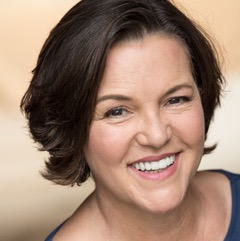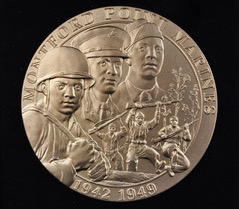A daughter honors the father she never knew
By Christine Jacobsen*
For months after I received the surprise DNA test results that revealed a not parent expected (NPE) event, I was obsessed with research into all things regarding a deceased Black man named Paul Keith Meeres, my biological father.
During the Vietnam War, I was more likely to identify with draft dodgers and conscientious objectors than someone who had actually served in the military, so it was a surprise to find out that Paul Meeres was a Marine in 1943 in World War Two.
Ancestry.com’s extensive records cited his rise in rank from private to sergeant and back to private on the muster rolls, and I was curious about the reason for this military inconsistency. I’d already received his death certificate, so I used it when looking for answers and requesting information from the National Archives.
Discharge papers arrived with a picture of Paul Meeres on his first day of muster. It was sad seeing a photograph of my biofather as a teenager going off to war. He looked so young. I was relieved to learn he was honorably discharged because I was learning about some of his self-destructive behaviors and feared that they might be the cause for a demotion in rank. Unfortunately, there was no information about the demotion. I would need personnel records to obtain that information.
On a beautiful warm day in September 2018, I was in Dumbo, Brooklyn, sightseeing with out-of-town friends. The change in military rank continued to trouble me as I wandered through photography exhibits under the Brooklyn Bridge. Separated from my friends for a moment, I stumbled upon an exhibit by the Marines. I asked Sergeant Bryan Nygaard if he knew how a demotion in rank happens. He asked where my father had been stationed.
When I told him Camp Lejeune and Montford Point, he said with an air of admiration, “Oh, he was a Montford Point Marine!”
He told me that in 1943 the first cohort of Blacks were allowed in the Marines, and that there could have been any number of reasons someone got demoted; racism could be one of them. He gave me his card and said to contact him if I had any further questions.
As I walked away from the Marine exhibit wondering why Sgt. Nygaard seemed so impressed with where my father had been stationed, my first cousin, whom I found on 23andMe.com, called me. She had a close relationship with Paul Meeres, who was her uncle. After we spoke, she texted me a photo of him in the Marines while he was stationed in Japan.
When I got home that day, I resumed my obsessive researching about my paternal line, focusing on the Montford Point Marines.
In 1941, Black civil rights leaders pressured President Franklin D. Roosevelt to issue a decree banning discrimination in the defense industry. They threatened to send tens of thousands of protestors to Washington, DC.
Days before the protest march was to take place, President Roosevelt signed an executive order prohibiting government agencies from barring employment in the defense industries on the basis of race, color, national origin or creed. It was the first presidential decree issued on race since Reconstruction.
Thousands of Black men were eager to serve during the Second World War. They enlisted in the various arms of the military, and following this decree were allowed to become Marines. Once Marines, they were sent to Camp Lejeune, North Carolina, and were stationed at the adjacent segregated base camp called Camp Montford Point.
I thought about my teenage biofather coming from New York and being forced to ride in the segregated area of the train once it crossed the Mason-Dixon line—the indignity of it. And the further injustice of shuttling him and his fellow Marines to the base camp barracks in the backwoods. The segregated base camp was substandard compared to Camp Lejeune: the decrepit buildings were falling apart. When the men left base camp, they were often spat upon. As I became aware of the racism he experienced, I felt a confusing mix of emotions: guilt as a person who’d identified as white and anger reckoning with my new ethnicity.
Then on Wikipedia I saw that 66 years after my father’s tour of duty, President Obama and Congress awarded all 20,000 of the Montford Point Marines the Congressional Gold Medal. The greatest civilian honor Congress can bestow. My hands shook as I sobbed at this on my computer screen.
I knew the family never even knew about or received the awards in 2012. Could it still be given posthumously? I wondered how I could make that happen.
Since Staff Sgt. Nygaard had given me his business card, I reached out to him for advice. He said he would look into it and sent me a photo from military archives dated 1944 depicting the Montford Point Marines at a swimming pool in the camp. A man stood on the high dive looking down at the swimmers. The caption read: Black Marines practice descending cargo nets in Montford Point’s training pool under the watchful eye of Sergeant Paul Meeres (on board) (USMC Photo 8275). I was thunderstruck with pride.
Finally, after I provided the New York Chapter of the Montford Point Marines Paul Meeres’ discharge papers and death certificate, they wanted to present the Congressional Gold Medal to the surviving family at the annual dinner/dance less than two months from then, on November 18th, 2018.
I wasn’t sure why I was so anxious for Paul Keith Meeres to get this medal—whether it was for him, for me, for the legacy of the Montford Point Marines, or all of these. Was it for redemption? If so, who was being redeemed?
And then I was asked for a biography of my father’s postmilitary life.
Because he had been a minor celebrity, I was able to learn from online photos that after the war he’d had an international dance career; he also had a violent streak. He struggled with sobriety and fathered multiple children he didn’t support or know about, like me. I grappled with the idea of honoring a man who behaved dishonorably at times, but the more I found out about the Montford Point Marines and their struggles with racism and segregation, the more passionate I became about honoring courage and service to country.
“I’m stuck,” I said to my adult son, Alek.
All I’d been asked for was a simple biography of his postmilitary life. At first I thought about writing of his illustrious show business career, but then paused because of his messy, complicated, flawed side. I still had an unrealistic idea about the military; I imagined the attendees at the ceremony would be upright citizens who were morally correct and intolerant of behaviors they might consider dishonorable.
“What do you mean?” Alek asked. At times like these, when I admit to feeling unsure in front of my son, I feel less like a senior citizen, and more like a confused child.
“I’m embarrassed that Paul Keith Meeres’ life was so out of the normal. I bet the Marines at the ceremony have had education, jobs, marriages, and children they raised. He didn’t do any of those things.”
He asked me, “Do you think any of the Marines or their families have experienced any of these conditions? Have they had alcoholism, violence, and dysfunction in their lives?”
I thought about the foolishness of my assumptions—that because they were Marines they didn’t possess the character flaws and defects we all struggle with. With Alek’s guidance, a layer of humiliation slid off my body. I could still respect Paul Meeres’ service in the military during World War 2 while opening my heart to his humanity. I wrote that biography and a speech because my son was right—the Montford Point Marines and their families would understand, maybe better than any others, the struggle to be human. This was part of my inheritance as the daughter of a Montford Point Marine, a mixed-race woman whose ancestors echoed down to her from the past.
I invited all my newfound relatives to the ceremony, but only my half-sister, Paula, whom I had just met just twice prior to that evening, was able to come. With my husband, Angelo, now four weeks after hip replacement surgery, I picked her up at her house. She wore a glittery top and ruby red lipstick. Alek met us at Antun’s, the venue in Jamaica, Queens.
“Do you want to stand with me during the ceremony?” I asked Paula. We held hands a lot that evening, and later, looking at the video of the event, I noticed I put my arm around her almost instinctually.
The color guard marched in as an Audra Day track of “I’ll Rise Up” played in the background. From the first bar of that song, I tried not to cry.
On easels behind my sister and me were framed declarations from President Obama and the Marines. The medal, nestled in a velvet lined box, was heavy as I held it in my hand.
The inscription read For Outstanding Perseverance and Courage that inspired social change in the Marines Corps.
The tears I tried so hard to hold back flowed down my cheeks as I stepped up to the podium to give my speech:
Nelson Mandela said “what counts in life is not the mere fact that we lived. It is what difference we have made to the lives of others that will determine the significance of the life we lead.” The Congressional Gold Medal affirms the significance of the life of Paul Keith Meeres and the other Marines who trained at Montford Point Camp. In this day of increasing intolerance and division in our country, it is heartening to realize that Congress, in 2012, was able and willing to show the national appreciation for the distinguished achievement and contribution the Montford Point Marines gave to American history and importantly, to African American history. The qualities of standing firm despite formidable odds, racism, and inhumane treatment is the mark of a hero, the making of the Montford Point Marines. My family and I are grateful for the patriotism Paul Meeres exhibited and the difference he made in the lives of the Marines who followed him. Semper fi.
After the ceremony, in the photo session, several Montford Point Marines, all in their 80s and 90s, were brought up to pose for pictures with us. One came up to me and said, “I remember Sgt. Meeres. He was my swimming instructor.” It was a great honor to be in their company, to acknowledge the Montford Point legacy, and mark my allegiance to my biological father. We were in a sea of multihued faces and military uniforms and were welcomed into the Montford Point community, descendants of Paul Keith Meeres.
Always faithful.
When the ceremonies were over, the dance floored was cleared and we all boogied to the tune of the Electric Slide, Paula, me, Alek, and Angelo, who stood on the dance floor with us, leaning on his cane.
*Adapted from her book, “Dancing Around the Truth”
Christine Jacobsen is a retired school counselor who dedicated 20 years to education in upstate New York. Prior to that she had an engaging, decade-long career in the performing arts, appearing on Broadway and feature films. She’s written for local magazines and school journals highlighting topics of human development. Her debut memoir was inspired by a DNA test surprise, which left her asking herself, “Who Am I?” Follow her on Twitter @Christinesstory and on Instagram @christinefromqueens.


BEFORE YOU GO…
Look on our home page for more articles and essays about NPEs, adoptees, and genetic genealogy.
- Please leave a comment below and share your thoughts.
- Let us know what you want to see in Severance. Send a message to bkjax@icloud.com.
- Tell us your stories. See guidelines.
- If you’re an NPE, adoptee, or donor conceived person; a sibling of someone in one of these groups; or a helping professional (for example, a therapist or genetic genealogist) you’re welcome to join our private Facebook group.
- Like us on Facebook and follow us on Twitter and Instagram @Severancemag.





1 comment
You are one determined woman 💕